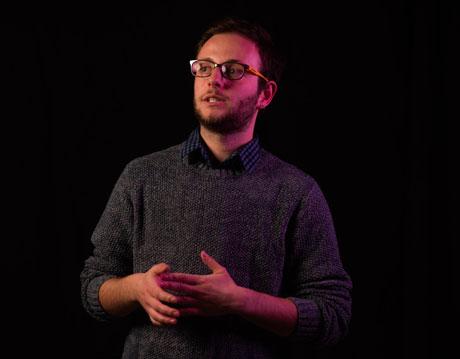Tell us a bit about yourself
Clair Chaigne, I come from small village near Bordeaux and I’ve been living in Toulouse for almost 8 years now. My interests are the cinema (I actually came to Toulouse initially to study film editing, but as you can see, I’ve deviated from that plan!), drawing, writing, music (I play the violin and trombone, and I’m looking for people who’d be interested in playing with me), swimming, playing the “Slam” TV programme... and sleeping. I try to keep up these activities as best I can, despite the fact my thesis doesn’t leave me much time or energy for other things.
Along the lines of “Ma Thèse en 180 secondes”, but in written form, can you tell us about your thesis?
The title of my project is “Role of atypical photoreceptors in the transmission of the direct and circadian effects of light on diurnal vertebrates”. To put it simply, I study special cells - neurons that are sensitive to blue light (they have a blue light receptor called melanopsin). They are known as “atypical photoreceptors” because they don’t have the same morphology or way of functioning as the standard photoreceptors involved in vision.
In humans, these neurons are located in the eye and are part of a “non-visual” light channel that influences many biological processes including sleep. It’s because of these neurons that we recommend you avoid watching videos of cats licking their tails on Sunday evening at 11 pm, for example, or advise you not to install a blue light filter on your phone, since it will stop you falling asleep easily. I study these neurons in a diurnal vertebrate (of which we are one) - zebrafish larvae - a model that is often used in the field of chronobiology (study of day-night cycles), and much more convenient to use than a human being. I do my best to compare mutant larvae (in which melanopsin is no longer expressed, meaning the neurons are no longer blue-light sensitive) and non-mutant larvae, from a behavioural and molecular standpoint.
For example, I film larvae in different lighting conditions (day/night, total blackout, constant light, and so on) and, using a software application that lets me analyse the distance travelled by each larva, I compare the locomotor activity and sleep patterns of mutant larvae versus non-mutant larvae. I also try to ascertain at molecular level whether I can see any deregulation in the gene expression of mutant larvae, which might explain the deviations detected in terms of behaviour. I focus more closely on certain genes that are usually expressed according to circadian rhythms, i.e. in a rhythmic way depending on the time of day, such as, for example, the key enzyme involved in melatonin synthesis, which occurs more frequently at night than during the day. So I observe whether these genes are still expressed rhythmically in mutant larvae and whether the expression rates are the same.
To do this, I extract the RNA from the larvae (the product of the gene) several times during the day (and night...) and I quantify the RNA that interests me using a machine, a whole lot of tubes and a fair amount of elbow grease. Thankfully, I’m not alone in all this - my thesis supervisor helps me with my experiments, and she's also there to support me when I have to go to the lab at 3 o'clock in the morning. To sum up, during my thesis, I spend a lot of time watching zebrafish larvae sleep, and I don’t sleep a lot myself!
How do you imagine life after your thesis?
At the moment, it’s difficult to make any plans. I do what I do because I find it so interesting and it gives me pleasure, which is why I chose to do a thesis after my first degree. After that, I’ll see whether I’m still so passionate about science, and whether I see myself making a career out of it.
Unfortunately, when I look at the post-thesis perspectives in a public laboratory, I get pretty discouraged - there are so few positions available and so many applicants. You really need to be highly motivated and get lucky.
What did the MT180 exercise teach you that you feel will be useful in your future career?
The MT180 exercise helped me feel a lot more comfortable talking about science, and taught me how to discuss research work in easy-to-understand terms for a wider audience. It also forced me to learn to be concise and hold people’s attention, and I think those skills are more and more important in today's world, where everything happens so quickly and you have to know what to say to stand out and leave your mark on people in order to get ahead in the professional world. And let’s not forget - it also provided me with an extra validated module.


